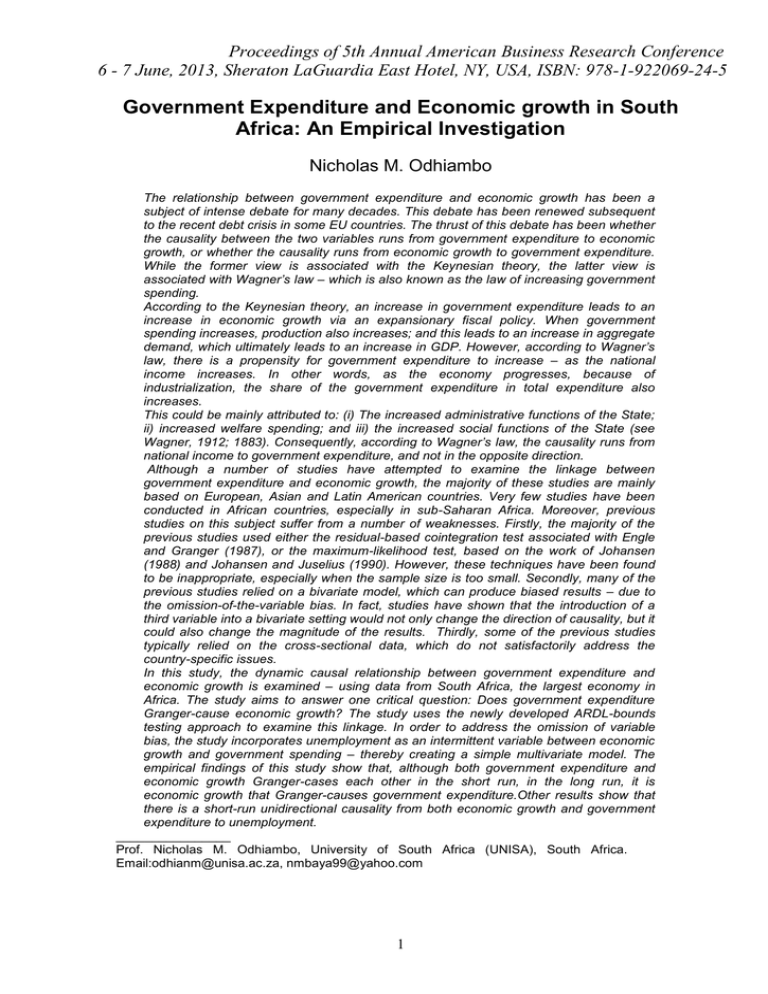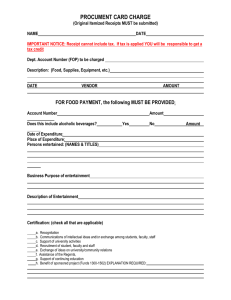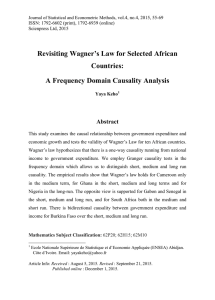Proceedings of 5th Annual American Business Research Conference
advertisement

Proceedings of 5th Annual American Business Research Conference 6 - 7 June, 2013, Sheraton LaGuardia East Hotel, NY, USA, ISBN: 978-1-922069-24-5 Government Expenditure and Economic growth in South Africa: An Empirical Investigation Nicholas M. Odhiambo The relationship between government expenditure and economic growth has been a subject of intense debate for many decades. This debate has been renewed subsequent to the recent debt crisis in some EU countries. The thrust of this debate has been whether the causality between the two variables runs from government expenditure to economic growth, or whether the causality runs from economic growth to government expenditure. While the former view is associated with the Keynesian theory, the latter view is associated with Wagner’s law – which is also known as the law of increasing government spending. According to the Keynesian theory, an increase in government expenditure leads to an increase in economic growth via an expansionary fiscal policy. When government spending increases, production also increases; and this leads to an increase in aggregate demand, which ultimately leads to an increase in GDP. However, according to Wagner’s law, there is a propensity for government expenditure to increase – as the national income increases. In other words, as the economy progresses, because of industrialization, the share of the government expenditure in total expenditure also increases. This could be mainly attributed to: (i) The increased administrative functions of the State; ii) increased welfare spending; and iii) the increased social functions of the State (see Wagner, 1912; 1883). Consequently, according to Wagner’s law, the causality runs from national income to government expenditure, and not in the opposite direction. Although a number of studies have attempted to examine the linkage between government expenditure and economic growth, the majority of these studies are mainly based on European, Asian and Latin American countries. Very few studies have been conducted in African countries, especially in sub-Saharan Africa. Moreover, previous studies on this subject suffer from a number of weaknesses. Firstly, the majority of the previous studies used either the residual-based cointegration test associated with Engle and Granger (1987), or the maximum-likelihood test, based on the work of Johansen (1988) and Johansen and Juselius (1990). However, these techniques have been found to be inappropriate, especially when the sample size is too small. Secondly, many of the previous studies relied on a bivariate model, which can produce biased results – due to the omission-of-the-variable bias. In fact, studies have shown that the introduction of a third variable into a bivariate setting would not only change the direction of causality, but it could also change the magnitude of the results. Thirdly, some of the previous studies typically relied on the cross-sectional data, which do not satisfactorily address the country-specific issues. In this study, the dynamic causal relationship between government expenditure and economic growth is examined – using data from South Africa, the largest economy in Africa. The study aims to answer one critical question: Does government expenditure Granger-cause economic growth? The study uses the newly developed ARDL-bounds testing approach to examine this linkage. In order to address the omission of variable bias, the study incorporates unemployment as an intermittent variable between economic growth and government spending – thereby creating a simple multivariate model. The empirical findings of this study show that, although both government expenditure and economic growth Granger-cases each other in the short run, in the long run, it is economic growth that Granger-causes government expenditure.Other results show that there is a short-run unidirectional causality from both economic growth and government expenditure to unemployment. ________________ Prof. Nicholas M. Odhiambo, University of South Africa (UNISA), South Africa. Email:odhianm@unisa.ac.za, nmbaya99@yahoo.com 1


